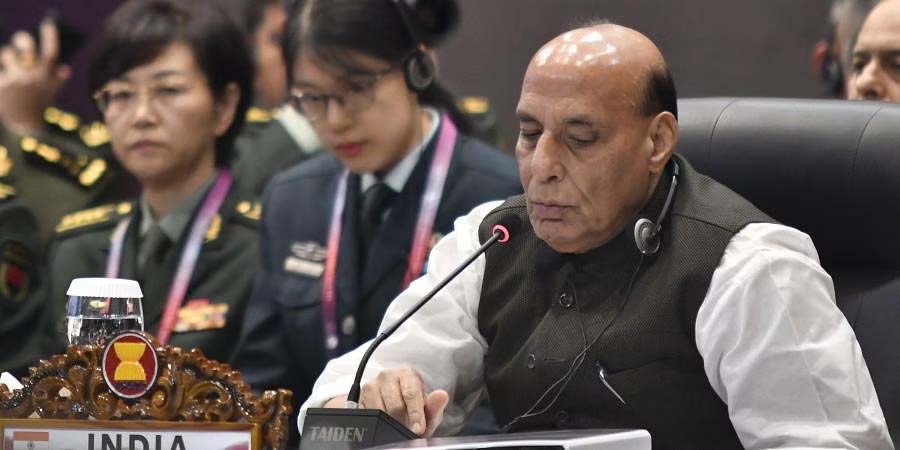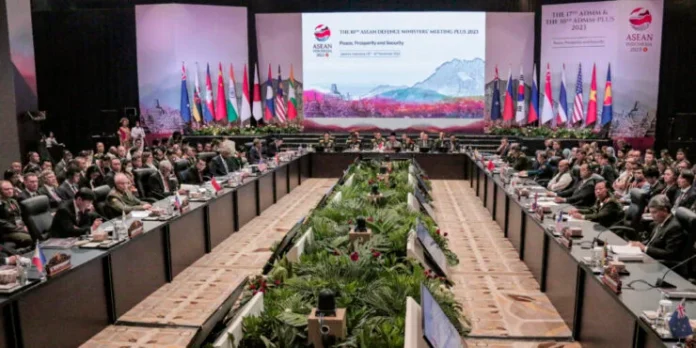Objectives and activities of ADMM-Plus: ASEAN Defence Ministers’ Meeting-Plus (ADMM-Plus) is a platform for ASEAN and its eight Dialogue Partners – Australia, China, India, Japan, New Zealand, the Republic of Korea, Russia and the United States (collectively referred to as the ‘Plus Countries’) – to strengthen security and defence cooperation for peace, stability, and development in the region. India became the dialogue partner of ASEAN in 1992. The Inaugural ADMM-Plus was convened in Hanoi, Vietnam, on 12 October 2010. Since 2017, the ADMM-Plus has met annually to allow enhanced dialogue and cooperation among ASEAN and the Plus Countries amid an increasingly challenging regional security environment.
The objectives of the ADMM-Plus include: (i) Capacity building of ASEAN Member States to address shared security challenges. (ii) To promote mutual trust and confidence between defence establishments. (iii) To enhance regional peace and stability through cooperation in defence and security. (iv) To contribute to the realisation of an ASEAN Security Community, as stipulated in the Bali Concord II. (v) To facilitate the implementation of the Vientiane Action Programme, which calls for ASEAN to build a peaceful, secure and prosperous ASEAN, and to adopt greater outward-looking external relation strategies with friends and Dialogue Partners.
ADMM-Plus focuses on: (i) Maritime Security (MS), (ii) Counter-terrorism (CT), (iii) Humanitarian Assistance and Disaster Management (HADM), (iv) Peacekeeping Operations (PKO), (v) Military Medicine (MM), (vi) Humanitarian Mine Action (HMA) and (vii) Cyber Security (CS).
The ADMM-Plus serves as a platform for practical cooperation among the participating countries’ defence establishments. The ADMM-Plus currently focuses on seven areas of practical cooperation: (i) Maritime Security (MS), (ii) Counter-terrorism (CT), (iii) Humanitarian Assistance and Disaster Management (HADM), (iv) Peacekeeping Operations (PKO), (v) Military Medicine (MM), (vi) Humanitarian Mine Action (HMA) and (vii) Cyber Security (CS).
The 10th ASEAN Defence Ministers’ Meeting (ADMM), 2023 exchanged views and expressed deep concern about the deteriorating situation in Gaza and, in this context, reaffirmed the ASEAN-GCC Leaders’ Statement on development in Gaza and the ASEAN Foreign Ministers’ Statement on the recent escalation of armed conflicts in the Middle East of 20 October 2023.
Belligerent China’s assertions in South China Sea
The ADMM-Plus meeting is significant in light of certain incidents on troubled waters in the South China Sea. On October 23, the Philippines accused Chinese coastguard vessels of “intentionally” colliding with its vessels on a resupply mission in a disputed part of the South China Sea. China’s embassy in Manila said it had lodged stern representations to the Philippines over its vessels “trespassing”, and called on the Philippines government to stop “causing trouble and provocation” at sea and to stop smearing China’s reputation with “groundless attacks”. In the 9th ADMM-Plus edition (Cambodia) in 2022, the joint declaration reaffirmed the importance of freedom of navigation and overflight, with the Taiwan Strait and the territorial disputes in the South China Sea in mind. It reiterated its commitment to enhancing information-sharing and following the Code for Unplanned Encounters at Sea, which mitigates the risk of incidents. This was included in light of Chinese expansionist activities and the American response to them.
On the sidelines of the ADMM-Plus meeting in Jakarta, Rajnath Singh held talks with Vietnam’s Defence Minister General Phan Van Giang, Indonesia’s Defence Minister Prabowo Subianto, and Timor-Leste’s Defence Minister Rear Admiral Donaciano Do Rosário da Costa Gomes
Four days later, on October 27, a Chinese fighter jet came within three metres (10 feet) of a US B-52 bomber while flying over the South China Sea. US Indo-Pacific Command statement underscored the potential for a mishap at a time when the United States and China are competing for influence in the region. The statement observed that the Shenyang J-11 twin-engine fighter jet closed on the US plane at an “uncontrolled excessive speed, flying below, in front of, and within 10 feet of the B-52, putting both aircraft in danger of a collision. China’s foreign ministry blamed the US, suggesting Washington’s aircraft was flying over the South China Sea as a deliberate provocation. Hopefully, there would have been informal consultations, deliberations and clarifications concerning South China Sea (SCS) disputes in the 10th ADMM-Plus that upholds a rules-based order and allows for freedom of navigation in the region. Interestingly, China extensively lobbied to exclude the mention of SCS in the 2015 Joint Declaration.

India-ADMM-Plus – a strategy towards India’s Act East Policy
Defence Minister Rajnath Singh attended the 10th ASEAN Defence Ministers’ Meeting-Plus (ADMM-Plus) in Jakarta, Indonesia on November 16, 2023. In his address, he affirmed the ASEAN centrality and appreciated its role in promoting dialogue & consensus in the region. He also reiterated India’s commitment to freedom of navigation, overflight and unimpeded lawful commerce in international waters under international laws, including the United Nations Convention on the Law of the Sea (UNCLOS) 1982. He committed to nurturing practical, forward-looking and result-oriented cooperation with ADMM-Plus to enhance maritime security in the region.
He reiterated India’s commitment to work with ASEAN and Plus Countries to ensure peace, prosperity and security, which was the theme for ADMM Plus-2023. He appreciated ASEAN Member States’ enthusiastic participation in India-ASEAN activities, particularly the Initiative for Women in UN Peacekeeping Operations, and Initiative for Marine Plastic Pollution Response. He also commended ASEAN Member States’ active participation in the maiden ASEAN-India Maritime Exercise held in May 2023, as well as in the Expert Working Group (EWG) on Humanitarian Assistance & Disaster Relief (HADR) activities, of which India and Indonesia are co-chairs in the current 2020-2023 cycle. India proposed to co-chair the EWG on Counter-Terrorism that was duly endorsed by ADMM-Plus.
On the sidelines of the ADMM-Plus meeting in Jakarta, Rajnath Singh met with the Minister of National Defence of Vietnam, General Phan Van Giang, and reviewed the progress in the implementation of the ‘Joint Vision Statement on India-Vietnam Defence Partnership towards 2030’. He also had insightful deliberations with the Defence Minister of Indonesia, Prabowo Subianto, and took stock of the bilateral defence relationship and re-committed to further strengthen cooperation, particularly in the maritime domain. He met the Defence Minister of Timor-Leste, Rear Admiral Donaciano Do Rosário da Costa Gomes, and discussed potential areas for future collaboration including the supply of Made-in-India defence equipment, capacity building and training.
In his address, Rajnath Singh affirmed the ASEAN centrality, appreciated its role in promoting dialogue & consensus in the region, and reiterated India’s commitment to freedom of navigation, overflight and unimpeded lawful commerce in international waters under international laws
Southeast Asian nations are recipients of arms, defence training, maintenance, and supply of spares from India. In 2022, India and the Philippines inked a $ 375 million deal for the sale of BRAHMOS missiles. In 2021, Myanmar is said to have received a remote-controlled air defence station worth $ 600,000 from Indian public sector manufacturing company Bharat Electronics Limited (BEL). India supplied a coastal surveillance system to Myanmar under an agreement signed in 2017. India had extended a Line of Credit (LOC) worth $ 100 million to Vietnam in 2013, which was used by the latter to purchase 12 offshore high-speed patrol boats for the Navy. As per a report, India’s Larsen & Toubro (L&T) has secured a contract to deliver 40 mm naval gun systems to the Indonesian Navy.
Conclusion
The ADMM-Plus has acknowledged the potential of the power rivalries and territorial disputes in the Indo-Pacific region that can generate a trust deficit among its members. As a result, the forum so far has restricted its agendas and mechanisms to address issues within the realm of non-traditional threats. For India, the ADMM-Plus is very important considering India’s endeavours to increase its strategic depth with the ASEAN nations through the ‘Act East’ policy. India’s proactive participation in ADMM-Plus in the past and the prospects of future collaboration have clearly illustrated that the forum will be a key driver of the comprehensive strategic partnership between India and ASEAN.
-The writer is Assistant Professor, School of Law, Presidency University, Bengaluru. View expressed are personal and do not reflect that of Raksha Anirveda
–The writer is Assistant Professor, ICFAI School of Liberal Arts, ICFAI University, Jaipur. The views expressed are of the writer and do not necessarily reflect the views of Raksha Anirveda






